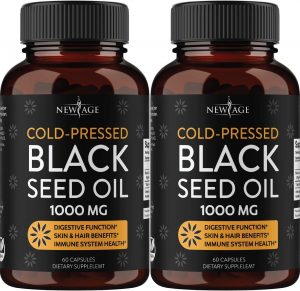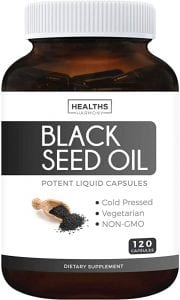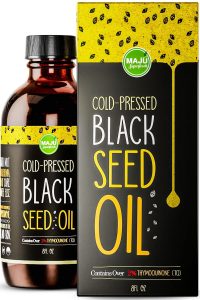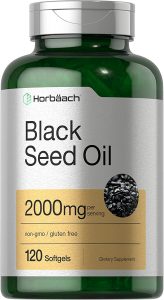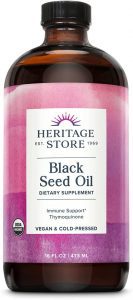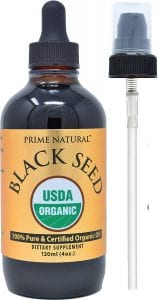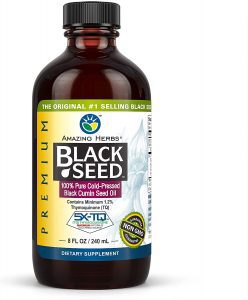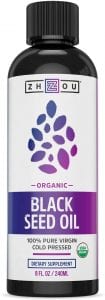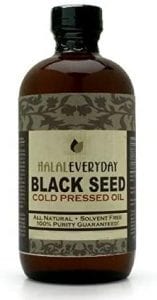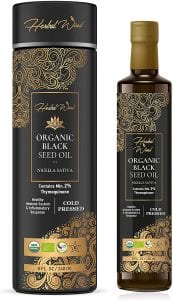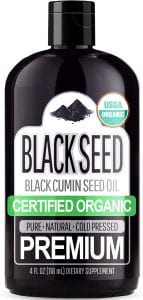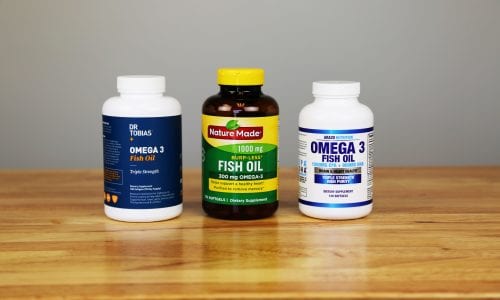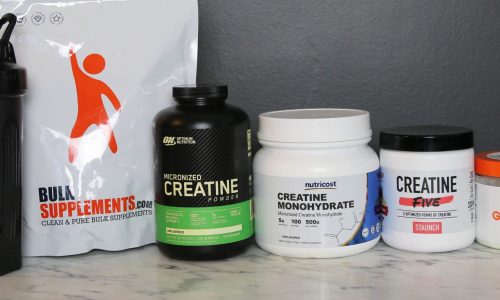The Best Black Seed Oil

Our Review Process
Don't Waste Your Money is focused on helping you make the best purchasing decision. Our team of experts spends hundreds of hours analyzing, testing, and researching products so you don't have to. Learn more.
Our Picks For The Top Black Seed Oils
- 1. NEW AGE Gluten-Free Certified Organic Black Seed Oil
- 2. Healths Harmony GMP-Certified Black Seed Oil Pill
- 3. MAJU Superfoods Organic GMO-Free Black Seed Oil
- 4. Heritage Store Liquid Immune Supporting Black Seed Oil
- 5. Horbäach Nutrient Rich Quick Release Black Seed Oil
- 6. PRIME NATURAL Hair Restoration Cold Pressed Black Seed Oil
- 7. Amazing Herbs Vegan All-Natural Black Seed Oil
- 8. Zhou Nutrition Digestive Balance Superfood Black Seed Oil
- 9. HalalEveryDay Solvent Free Undiluted Black Seed Oil
- 10. Herbal Wind Heart Health Unrefined Black Seed Oil
- 11. Sun Essential Oils Organic Cold Pressed Black Seed Oil
Not only is black seed oil known for aiding digestion, but it also works to support your immune system. This pack of two provides a 2-month supply, so you'll only need to order it six times per year. The company reports that the supplement is safe for the entire family with each serving offering 1,000 milligrams of oil.
Free of AllergensYou won't find any gluten, dairy, soy, nuts or shellfish in this black seed oil.
With this black seed oil supplement, you'll get the most nutrition out of each easy to swallow capsule. The capsules are formulated with added vitamin E and processed using cold pressing. Black seed oil is great for skin health and provides the body with much needed antioxidants.
Affordable Price TagIf you're looking for a high-quality black seed oil at a budget-friendly price, these softgels are an excellent choice.
Not only does this black seed oil reduce inflammation, but it also supports your immune system. This Turkish oil comes with three times as much thymoquinone as any generic bottle on the market. Users will find the color is light and the taste is great when added to a smoothie or cup of herbal tea.
Eco-Friendly PickThis black seed oil formula is free of GMOs and other harmful ingredients.
These black seed oil capsules come as softgels that are much easier to swallow. Each bottle provides a 30-day supply and you'll get 2,000 milligrams of the oil per serving. The quick-release formula means you won't have to wait long to reap the benefits of the supplement.
Easy to SwallowThis black seed oil is filled with nutritious omega-6 and omega-9 fatty acids.
Buying Guide
Nigella sativa is a flowering plant found in Europe, Asia and the Middle East. For centuries, black seeds have been extracted from the plants for medicinal purposes, with enthusiasts believing that they help with weight loss, improve skin health and assist in treating a variety of conditions, including cancer, liver disease, diabetes and infertility.
It’s important to note that no study has conclusively proven that N. sativa helps with any of these things, but some people have found they get benefits from it. Due to its popularity, manufacturers extract oil from the seeds and bottle them, distributing and selling it across the globe.
You may see the oil as coming from a variety of seed names, including black caraway, black cumin, kalonji and black onion. All fall under the umbrella name of “black seed oil,” so from there, it’s just a matter of determining the format and amount. As you’re shopping, you’ll probably notice many labels promote the same features, so it can get confusing to decide between multiple options.
One important feature mentioned often in black seed oil marketing materials is “cold-pressed.” This simply means that the oil was extracted without the use of heat, which can degrade the potency of the oil. By choosing a cold-pressed oil, you’re assured that the integrity of the nutrients was left intact during the process of removing the oil from the seed.
From there, though, many of the oils are promoting the benefits that come from the oil itself, no matter which brand you choose. However, what is important is the type of seeds the oil came from, including the region of origin. Look for black seed oil that came from seeds in Turkey, Syria, India, Egypt or Ethiopia as these are where the highest-quality seeds originate. Ethiopia is the best among those.
What to Look For
- Ingredients are important when choosing any natural supplement. Look for one that has no artificial ingredients.
- If you’re on a special diet, you can find black seed oil that promises to be gluten-free or vegan.
- Oils can degrade over time. To lengthen their lifespan, choose one in a dark-colored bottle that helps keep light out. No matter the color of your bottle, though, make a point of storing it in a dark place away from heat.
- Since black seed oil is extracted from a plant, pesticides can be a concern. Some brands advertise that their oil is pesticide-free, or free of heavy metals, among other chemicals.
- You have a variety of delivery options when you’re switching to black seed oil. It comes in capsule form, as well as in bottled liquid form. You may prefer a pill for its portability. Just slip some in a bag and take them on the go to always have your oil with you.
- The benefit of a liquid-based oil supplement is that you can use it topically. Some prefer to rub black seed oil on their skin and hair versus ingesting it. You can even add it to your shampoos, conditioners or lotions.
- If you choose to ingest your oil, though, you still can. Simply drop a little in your favorite beverage or meal. Be sure to carefully follow the instructions on the label.
- Look at the amount of thymoquinone in the black seed oil you’re choosing. Thymoquinone is considered both an antioxidant and anti-inflammatory. If thymoquinone does help with these issues, having higher potency may offer better results.
- It’s important to pay close attention to the source of any supplement you’re taking. Make sure it’s manufactured in a certified facility. If it’s lab-tested, that’s a bonus. Any details about the manufacturing process, including certifications, can give you confidence in the claims you’re reading on the product packaging.
More to Explore
How to Incorporate More Black Seed Oil Into Your Diet
Despite being around for centuries, black seed oil has become more popular as of late, holding a seat at the table next to bone broth, chia seeds and other trendy “superfoods.” It comes from the Nigella sativa flowering plant found in Europe, Asia and the Middle East, and has been used throughout history for its purported medicinal benefits.
Many people believe it can help improve overall health and well-being. Black seed oil contains the phytochemical thymoquinone, which offers anti-inflammatory properties.
However, it’s important to note that this oil remains largely unstudied. Yet many people have sung its praises. Historians even believe it to have been favored by King Tut, Cleopatra and Hippocrates to fight conditions such as malaise, weakness, coughing and more.
While the benefits of black seed oil remain largely unproven, it still might be worth giving this versatile, delicious oil a try. Stay mindful of its potential side effects, such as upset stomach or allergic rashes, and be sure to check with your doctor before adding black seed oil to your diet.
How To Add Black Seed Oil To Your Diet
This wonder seed oil is sold under a variety of names including black cumin, black caraway, kalonji and black onion. The recommended dose is 1 teaspoon of oil per day per person. While some find it to be similar to oregano and cumin in taste, others find it to be bitter and hot.
To preserve the integrity of its nutrients, avoid heating it. It’s best when eaten raw. Use it in salad dressings or blend it into smoothies. Mix it with honey or lemon juice to mellow out the taste.
It can also be a delicious addition to a colorful veggie bowl.
You can also find it in capsule or pill form. The benefit of purchasing a liquid-based oil is that you can use it topically as a treatment for skin conditions. Some people add it to lotions or shampoos and conditioners.
The best black seed oil will be manufactured in a certified facility. Third-party lab testing is preferred, which can offer some reassurance in marketing claims on product packaging.

